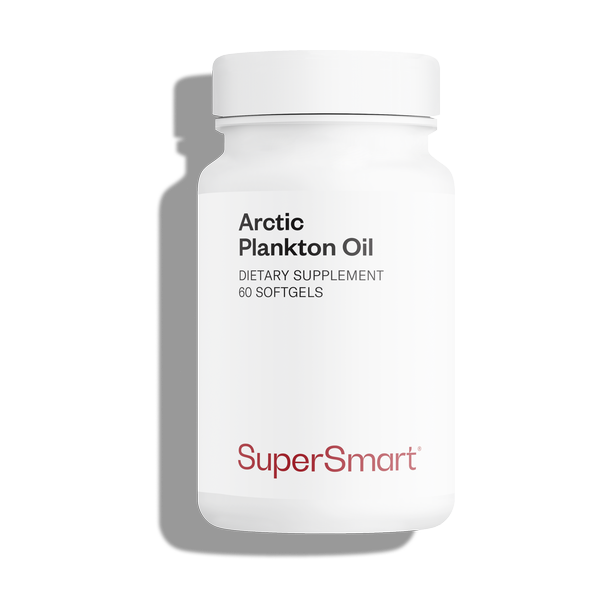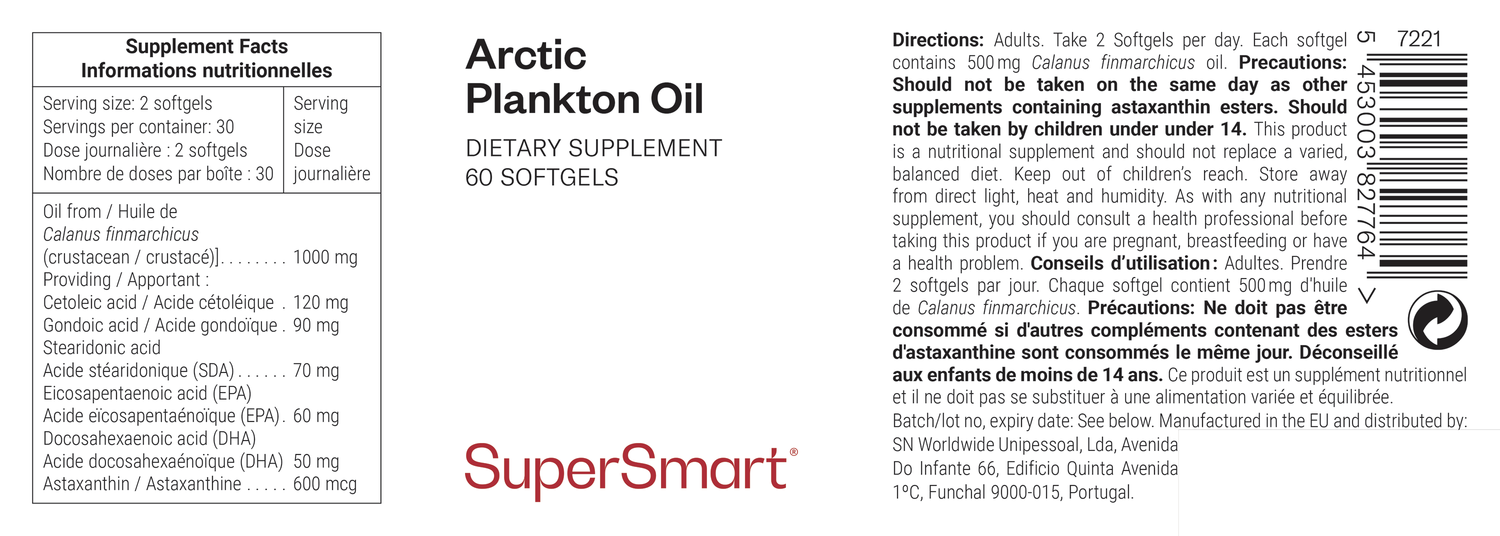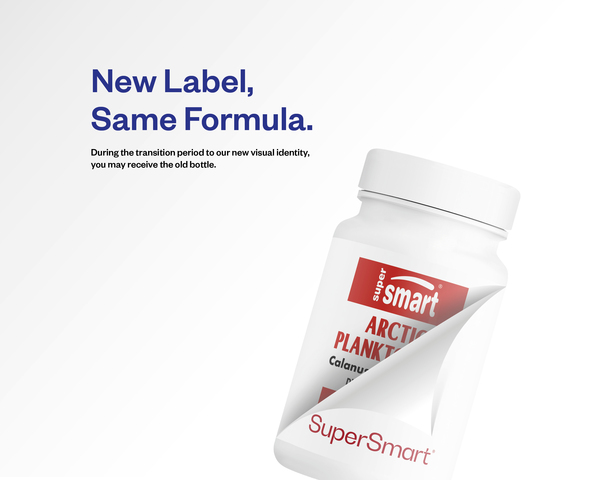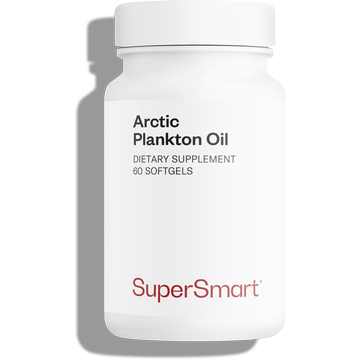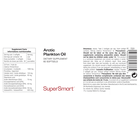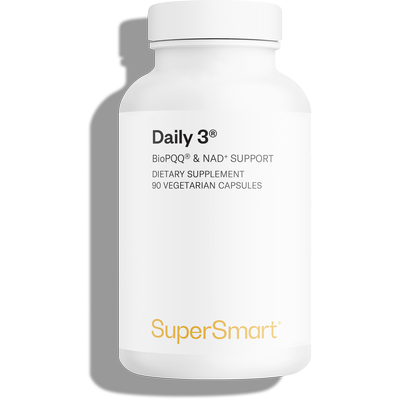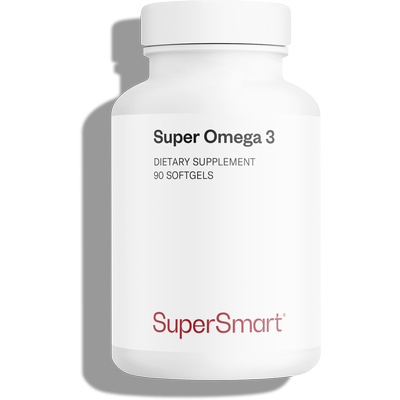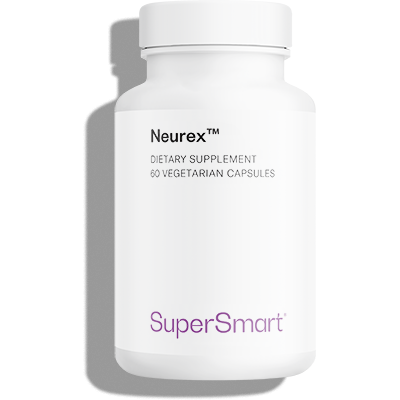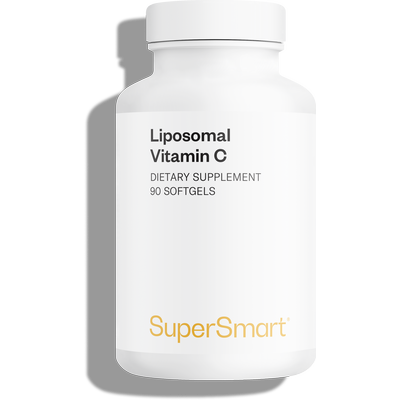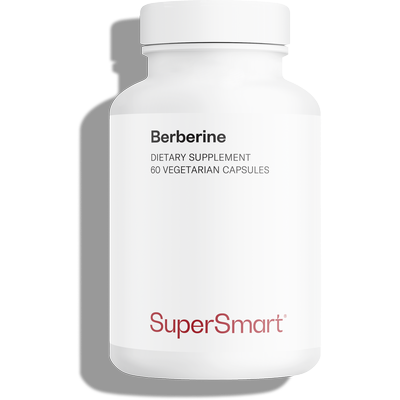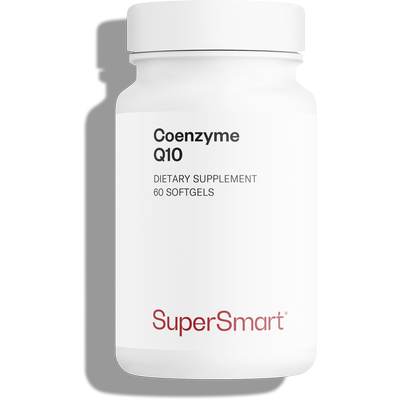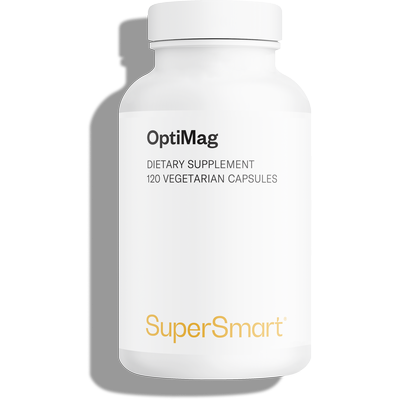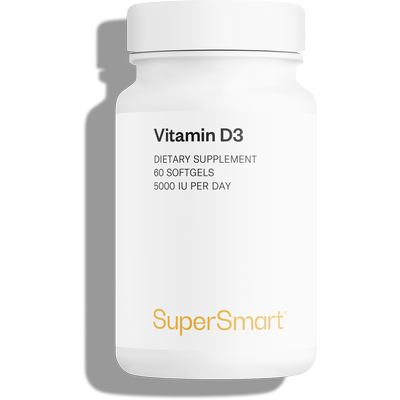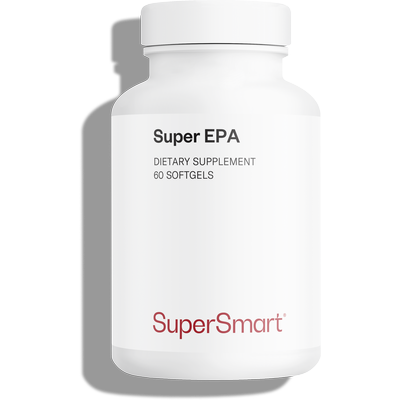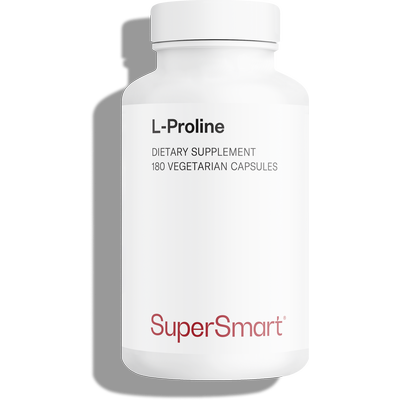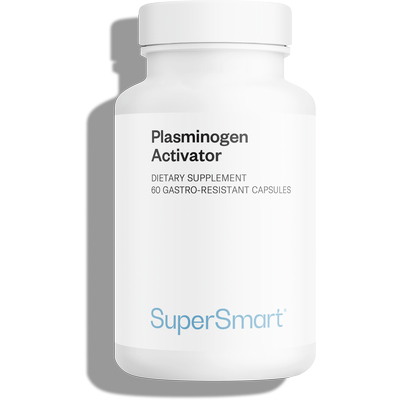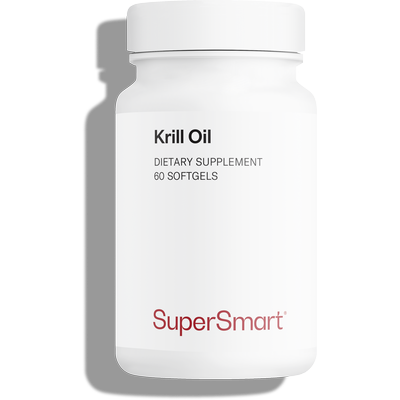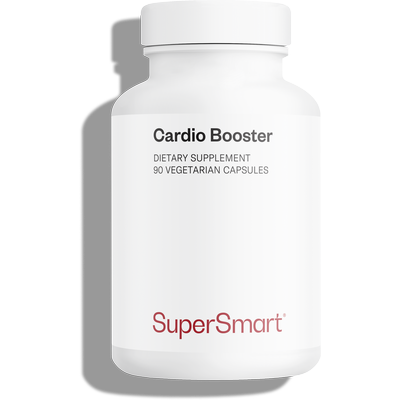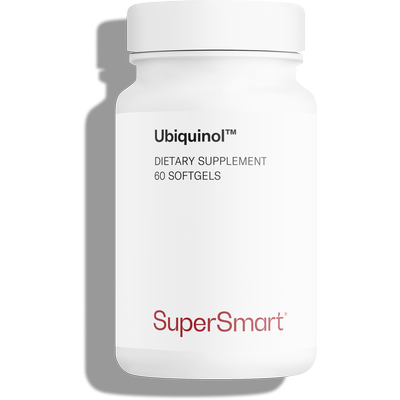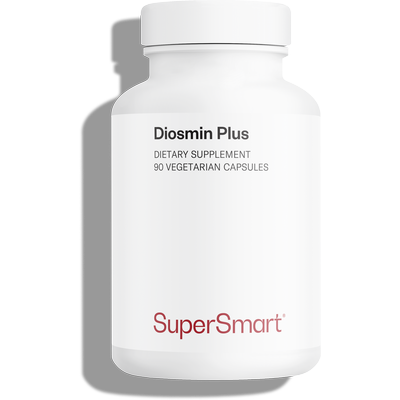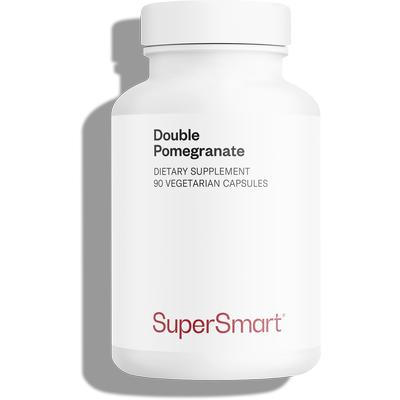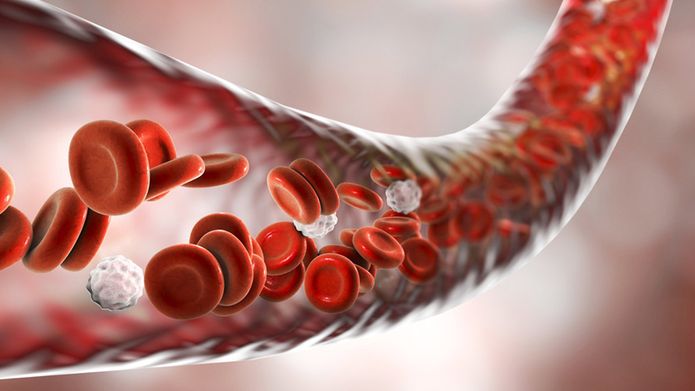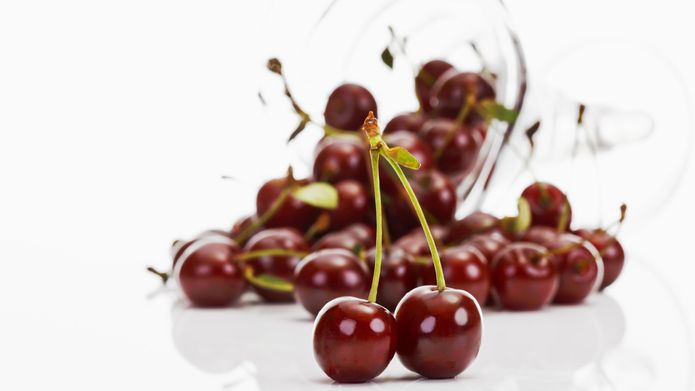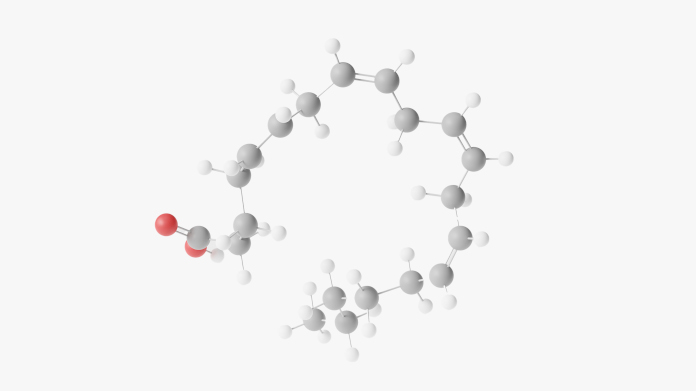Complete your selection
Arctic Plankton Oil is a totally new kind of omega-3 fatty acid supplement: it’s produced from an exceptionally rich species of zooplankton found in the Arctic regions of the North Atlantic, now available to buy at Supersmart.
It is a new, usable source of omega-3 fatty acids, which is not only more eco-friendly, Calanus finmarchicus being the most abundant animal species on the planet, but is also nutritionally superior and free from any contamination by heavy metals.
Like the fish oil in Super Omega-3, the Calanus oil in Arctic Plankton Oil helps optimise cardiovascular health, but it also produces more marked effects on abdominal fat and insulin sensitivity.
What are the particular features of Arctic Plankton Oil?
Unlike standard omega-3 supplements, Arctic Plankton Oil contains several types of fatty acid of exceptional biological richness, and in completely new forms.
- EPA and DHA (a scientifically-supported source of omega-3 (1)). It has been shown that these two compounds cross the blood-brain barrier by means of transport proteins specific to long-chain polyunsaturated fatty acids (2-3). Several clinical trials have definitively shown that when taken orally, EPA and DHA accumulate in tissues of the central nervous system.
- Cetoleic acid and gondoic acid, two omega-9 monounsaturated fatty acids which have beneficial effects on levels of ‘good’ cholesterol, hypertension and insulin sensitivity (4).
- Astaxanthin, a remarkable, deep red antioxidant. This powerful compound, which is responsible for the pink colour of prawns, helps protect against the harmful effects of UV rays and plays a role in the anti-inflammatory process (5).
- Stearidonic acid (SDA), a valuable omega-3 fatty acid which is present at significant levels in hemp seeds and spirulina.
What are the recognised benefits of omega-3?
Omega-3, particularly EPA and DHA, are molecules which penetrate the fatty layers that envelope the body’s cells, known as cell membranes. From this strategic site, they influence a wide range of functions.
- Potent anti-inflammatory effect. The incorporation of omega-3 into the body’s cell membranes effectively builds a valuable reserve which at any moment can be converted into anti-inflammatory molecules.
- Reduced risk of cardiovascular problems. The anti-inflammatory properties of omega-3 partly explain their well-documented ability to lower the risk of cardiovascular problems (hypertension, triglyceridaemia, LDL, atheromatous plaques)(8-10). But they are also able to control a large number of genes involved in lipid metabolism.
- Optimisation of cognitive function. In penetrating cell membranes, omega-3 make cells more supple and flexible. Membranes low in omega-3 are thus abnormally rigid, slowing down neurotransmission of information, and impairing neural extension development, synapsis establishment, neural plasticity, learning, maturation of neurons and their migration towards target zones (11).
- Protection of visual function. The DHA in Arctic Plankton Oil represents more than 30% of all the fatty acids present in the retina (12). It is one of the most important compounds constituting the membranes of the outer segments of photoreceptors and needs to be regularly renewed in order to optimise and protect vision (13).
Five reasons to choose Arctic Plankton Oil
- The biomedical research conducted on Arctic Plankton Oil was carried out by independent scientists at the Arctic University of Norway.
- The development of Arctic Plankton Oil is fully compatible with sustainable harvesting of the huge biological resource represented by Calanus populations.
- Calanus finmarchicus feeds solely on phytoplankton and does not accumulate any heavy metalsunlike oily fish rich in omega-3 fatty acids.
- Arctic Plankton Oil contains a rare form of omega-3 with additional benefits for metabolism.
- It also contains several synergistic compounds such as astaxanthin, a remarkable antioxidant which protects fragile omega-3, as well as omega-9 fatty acids that counteract the dominance of omega-6.
What is in it Arctic Plankton Oil
Any questions?
Arctic Plankton Oil is suitable for all sectors of the population for meeting recommended intakes for omega-3 fatty acids.
In addition, it is particularly recommended for the following groups of people:
- Those with a large waistline (excess abdominal fat).
- Those over 50 (to prevent cognitive decline and cardiovascular problems).
- Those suffering from chronic inflammation.
- Those with hypertension, hypertriglyceridaemia, hypercholesterolaemia or hyperglycaemia.
- Those suffering from fatigue or low mood.
- Those at risk of cardiovascular problems.
In theory, the body is able to produce EPA and DHA from plant-source omega-3 fatty acids, but this source has declined significantly over the last decades due to modern farming methods and changes in our diet (14). What’s more, the rate at which they’re converted is now very low as a result of our inappropriately-high consumption of omega-6 (15). Of far less benefit to the body, these fatty acids are nonetheless ubiquitous in modern processed foods and they mobilise all the enzymes (elongases and desaturases) needed for the conversion of plant-sourced omega-3s into DHA and EPA.
So if you decided to increase your intake of plant-sourced omega-3 fatty acids, you would not see any benefits unless you simultaneously made significant cuts to your omega-6 intake. The fact is, we actually need to consume the same amount of plant omega-3 as we do omega-6, but our actual consumption of omega-6 is 15-50 times greater than that of our plant-sourced omega-3. In excess, omega-6 displace omega-3 and invade cell membranes in their place, resulting in the formation of billions of pro-inflammatory molecules (16-17) which are thought to play a key role in the development and exacerbation of chronic diseases.
This adverse imbalance could be rectified through daily consumption of oily fish rich in EPA and DHA. Unfortunately, however, the level of contamination of these fish and the fact that they’re relatively inaccessible makes this an untenable option... Supplementing with EPA and DHA is thus the simplest and most effective way of rapidly restoring cell membranes to a healthy state.
Arctic Plankton Oil is produced from the species Calanus finmarchicus, a minuscule copepod which forms part of marine zooplankton. Measuring less than a millimetre but representing an enormous biological resource (it is without doubt one of the most abundant species on the planet in terms of biomass), Calanus finmarchicus is harvested from the Arctic in strict adherence to both the bioeconomic strategies of Scandinavian countries and the quotas fixed by the Institute of Marine Research. As this species inhabits the lowest trophic levels, there is no risk of the heavy metal contamination typically observed in oily fish.
In the cold waters of the Arctic, which is periodically covered in ice and isolated from pollution, it benefits from an idyllic setting providing the best possible conditions for reproduction and growth .
Click here to see the environment and conditions in which these copepods are harvested: https://www.youtube.com/watch?v=9X5W03gu7eA&t=7s
Following ingestion and absorption, marine-source omega-3 are incorporated into cell membranes in the form of phospholipids. This is a slow process: Arctic Plankton Oil therefore needs to be taken every day for several weeks or even months in order to fully obtain its benefits.
At the end of the supplementation period, the increased intake in omega-3 will be reflected in the composition of the phospholipid membranes. The NAT-2 study showed that supplementation with omega-3 produced a significant increase (up to 70%) in levels of these fatty acids in membranes. To achieve this, it is advisable to reduce your intake of omega-6 throughout the supplementation period.The cetoleic acid and gondoic acid in Arctic Plankton Oil help reduce the excessive proportion of omega-6 which impairs the body’s use of omega-3.
february 14 2024
Excellente source d'Oméga 3, j'alterne avec Krill Oil.
november 9 2023
Impeccable
june 13 2023
Me, and my mother don't have experience a lot with this, we eat a lot of fish, but it is an essential supplement for generally health. The source from the arctic sea without polution is from high quality. You can add this to your diary diet.
january 30 2021
Excellent! Pour accompagner avec une bonne «�diet�» et faire descendre le mauvais colesterol.
april 5 2024
Excellent produit pour divers maux : Inflammation au niveau du squelette et composé d’oméga 3 et dha indispensables pour le cerveau.
Need help?
You may also like

